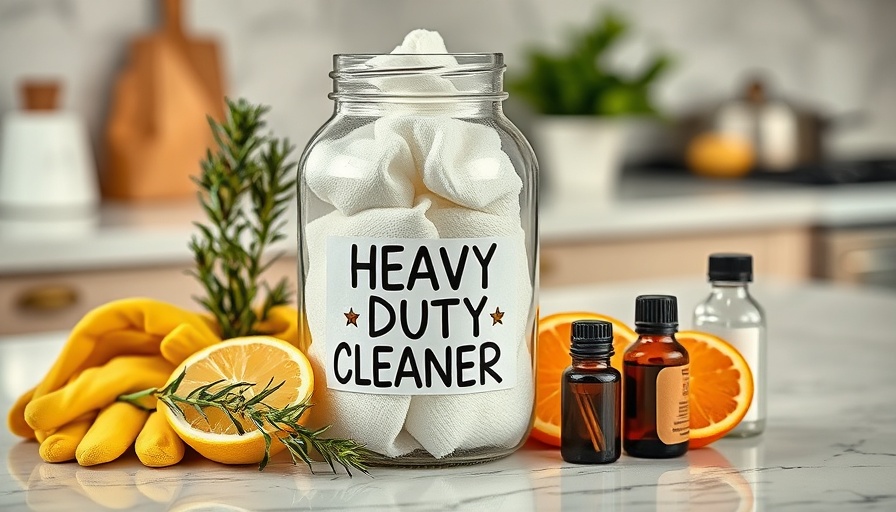
Why Embrace Natural Cleaners in Your Kitchen?
As kitchens are often considered the heart of the home, they require special attention, especially when it comes to cleanliness. Traditional cleaning products can harbor a myriad of toxic ingredients, from sodium hydroxide to synthetic fragrances, which not only compromise the safety of food preparation areas but can also pose health risks to our families. Using a natural kitchen cleaner crafted from essential oils is an effective way to ensure a safe environment while also being gentle on both skin and the atmosphere.
Transform Your Kitchen with Essential Oils
Creating a homemade kitchen cleaner with essential oils is not only straightforward but also allows you to customize your cleaning experience. Essential oils like lemon and wild orange do wonders—not just for providing a pleasant scent but also for cutting through grease and handling germs effectively. Unlike conventional cleaners, which can mask odors and leave behind toxic residues, essential oils work in harmony with your home. They leave surfaces sparkling clean without the harmful side effects of heavy chemicals.
A Quick Recipe for Your DIY Kitchen Cleaner
Making your own kitchen cleaner can take just minutes and requires a few essential ingredients: distilled white vinegar, filtered water, and your choice of essential oils. A simple mix of one cup of white vinegar with one cup of water and 10-15 drops of an anti-bacterial oil like lemon or orange is all you need to get started. Keep your cleaner in a glass spray bottle and ensure to store it out of direct sunlight to maintain its potency. Moreover, this non-toxic cleaner should be safe for use on almost all kitchen surfaces—just be cautious with natural stones like granite or marble, as vinegar can potentially etch these materials.
Health Benefits of Switching to Natural Cleaners
Switching to non-toxic cleaners has distinct health benefits. Not only do these homemade alternatives reduce chemical exposure in high-contact areas like the kitchen, but they also promote better indoor air quality. Synthetic fragrances and preservatives found in conventional products can contribute to respiratory issues and allergic reactions. By choosing natural ingredients, you protect your family’s health while nurturing an eco-friendly home.
Cost-Effective and Eco-Friendly
Beyond health benefits, DIY kitchen cleaners can be incredibly cost-effective. The upfront investment in glass bottles and essential oils may seem slightly higher, yet the long-term savings on conventional cleaners will more than compensate it. Plus, by reducing reliance on single-use plastic bottles—common with commercial products—you’re actively contributing to a greener planet. Large quantities of distilled vinegar can yield multiple bottles of kitchen cleaner, further minimizing waste.
Frequently Asked Questions About DIY Kitchen Cleaners
Q: How long does a homemade kitchen cleaner last?
A: Typically, when stored in the fridge, your homemade kitchen cleaner can last up to three months.
Q: What essential oils work best?
A: Lemon, tea tree, and wild orange are popular choices due to their antibacterial properties and pleasant scents.
Q: Is it safe for all surfaces?
A: While it is safe for most surfaces, avoid using vinegar on natural stone, as it can cause damage.
Conclusion: A Cleaner Home Awaits You
Making the switch to a homemade kitchen cleaner with essential oils not only empowers you to control what goes into your products but also enhances the safety of your cooking space. With the many benefits ranging from health to cost-saving, it’s a change worth making. Now, consider crafting your unique blend and enjoy a fresh and clean kitchen environment. Small steps can make a significant difference in creating a healthier home.
 Add Row
Add Row  Add
Add 






Write A Comment